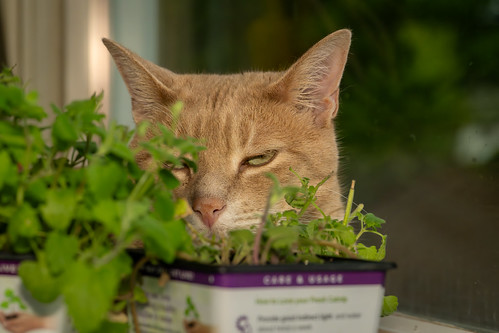The Science Behind Catnip and How It Affects Cats
If you’ve ever seen a cat go wild over a little green herb called catnip, you may have wondered what exactly is going on. Why do cats love catnip so much? Well, the answer lies in the science behind this mysterious plant and how it affects our feline friends.
Catnip, also known as Nepeta cataria, is a member of the mint family and is native to Europe and Asia. It contains a compound called nepetalactone, which is responsible for the unique reaction that cats have to it. When cats come into contact with catnip, whether by sniffing, licking, or rolling around in it, the nepetalactone binds to receptors in their nasal tissue, which then sends signals to the brain.
The reaction that cats have to catnip can vary from cat to cat. Some cats may become more playful and energetic, while others may become more relaxed and sedated. This difference in response is thought to be genetic, with some cats having a stronger sensitivity to nepetalactone than others.
Interestingly, not all cats are affected by catnip. It is estimated that around 50-70% of cats have a genetic predisposition to respond to catnip, while the rest are unaffected by it. Kittens under the age of 3 months are also typically not affected by catnip, as the receptors in their brains are not fully developed yet.
The effects of catnip typically last for around 10-15 minutes, after which the cat will lose interest in the herb. However, it can take up to a couple of hours for the cat’s receptors to reset, so it’s best to limit their exposure to catnip to prevent overstimulation.
While catnip is generally considered safe for cats, it’s important to use it in moderation. Some cats may become aggressive or overly excited when exposed to catnip, so it’s best to observe your cat’s behavior and adjust accordingly. If your cat has a particularly strong reaction to catnip, it’s best to limit their exposure to prevent any negative effects.
In addition to its effects on cats, catnip has also been used for centuries by humans for its medicinal properties. It has been used to treat a variety of ailments, including insomnia, anxiety, and indigestion. Catnip tea is a popular remedy for calming nerves and promoting relaxation.
So, the next time you see your cat going crazy over a little bag of catnip, you’ll know that it’s all thanks to the compound nepetalactone binding to receptors in their brain. While not all cats are affected by catnip, those that are can enjoy a brief moment of euphoria and playfulness. Just remember to use it in moderation and watch out for any signs of overstimulation. And who knows, maybe you’ll even find yourself reaching for a cup of catnip tea to help you relax after a long day.
